Sociology Essay: Exploring the Dynamics of Neoliberalism and Society
VerifiedAdded on 2022/08/28
|5
|1253
|29
Essay
AI Summary
This sociology essay critically analyzes Dani Rodrik's perspective on neoliberalism, focusing on its preference for markets over governance and its impact on economic inequality. The essay explores the flaws of neoliberalism, particularly its emphasis on economic science and neglect of social aspects, referencing examples like China to illustrate the importance of social realities in economic policies. It contrasts Rodrik's views with Ellen Meiksins Wood's Marxist approach, emphasizing the need to consider political and economic factors separately for a comprehensive understanding of neoliberalism and capitalism. The essay concludes by highlighting that a nuanced understanding of neoliberalism is necessary to address economic issues, incorporating insights from history, social backgrounds, and governance to create effective policies.
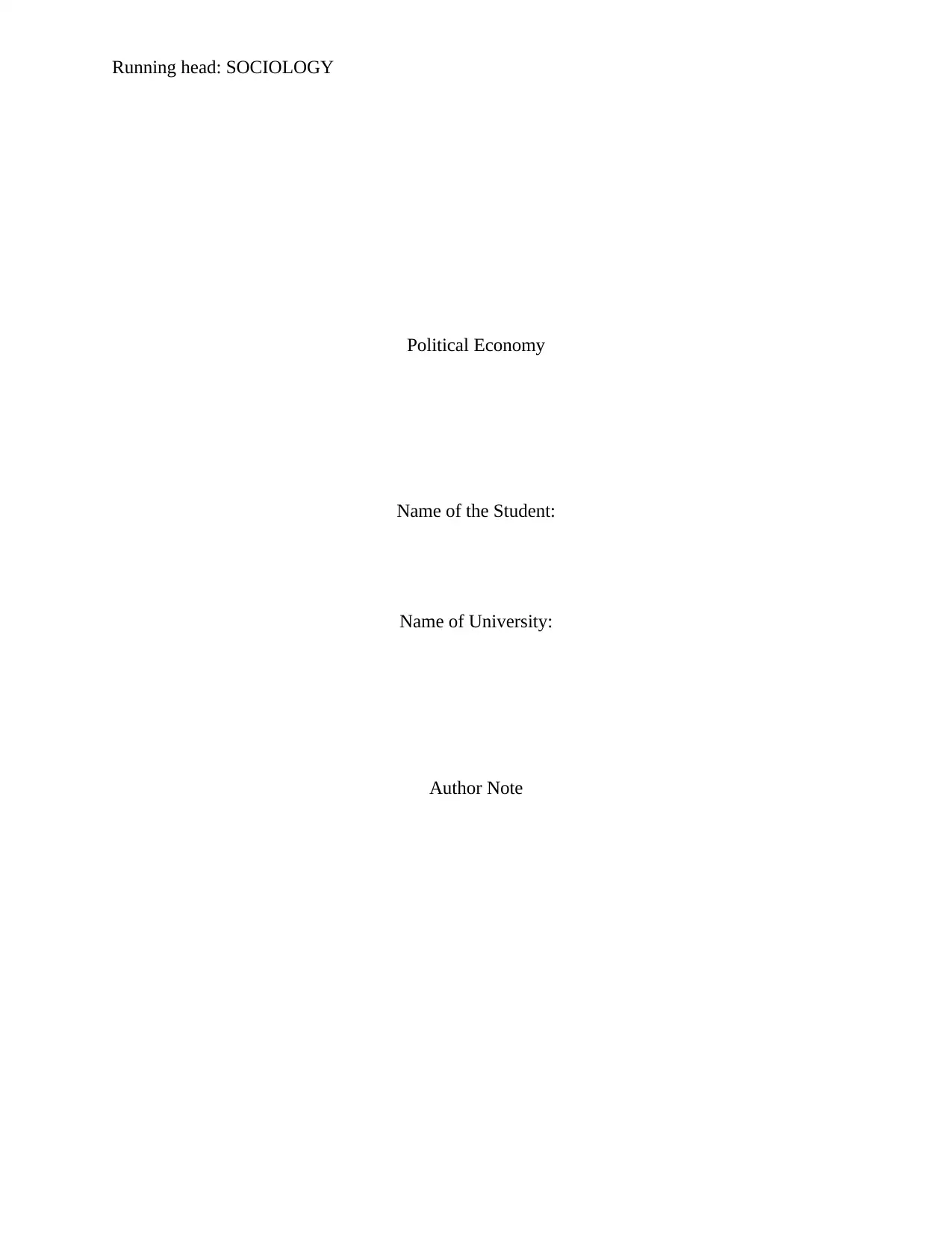
Running head: SOCIOLOGY
Political Economy
Name of the Student:
Name of University:
Author Note
Political Economy
Name of the Student:
Name of University:
Author Note
Paraphrase This Document
Need a fresh take? Get an instant paraphrase of this document with our AI Paraphraser
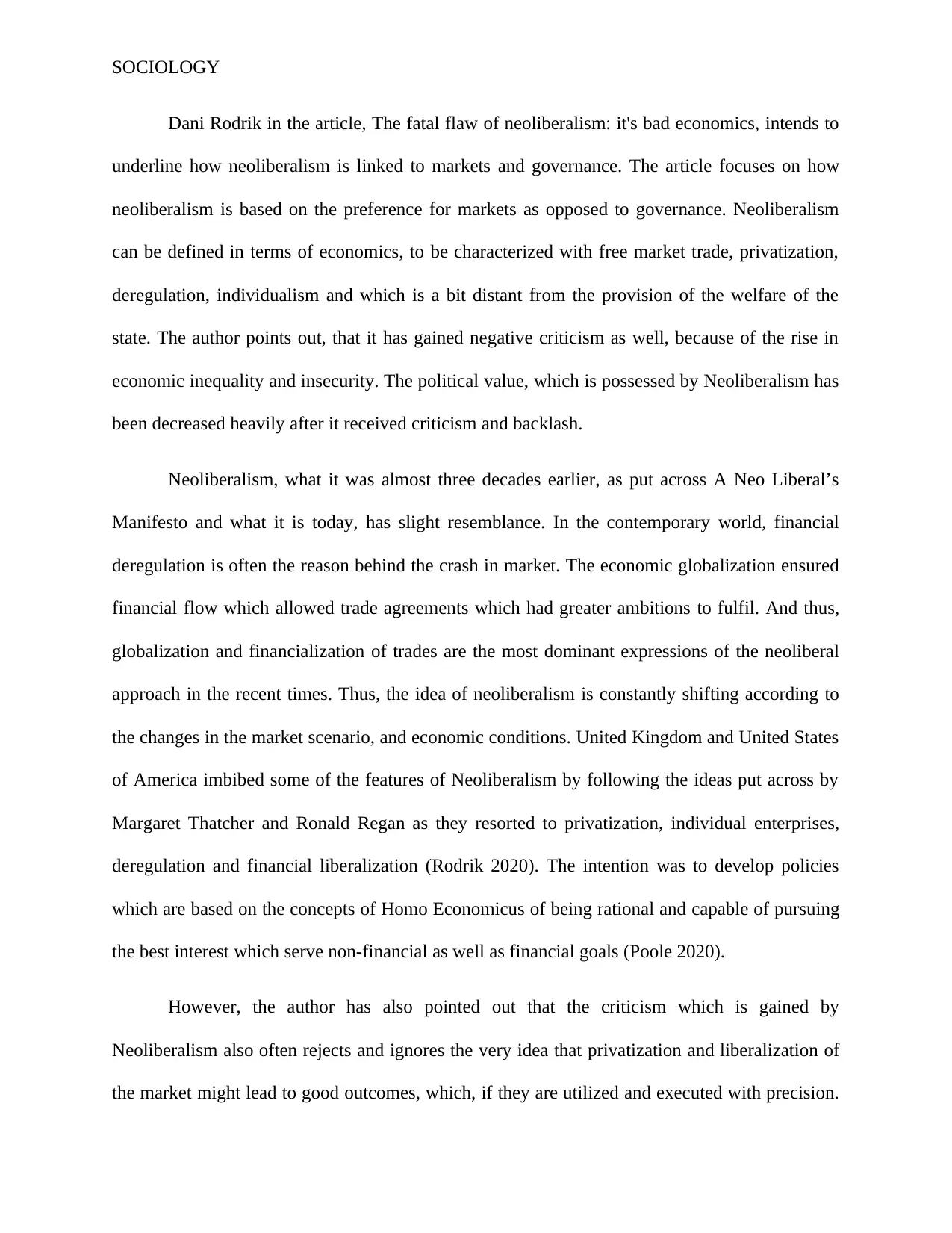
SOCIOLOGY
Dani Rodrik in the article, The fatal flaw of neoliberalism: it's bad economics, intends to
underline how neoliberalism is linked to markets and governance. The article focuses on how
neoliberalism is based on the preference for markets as opposed to governance. Neoliberalism
can be defined in terms of economics, to be characterized with free market trade, privatization,
deregulation, individualism and which is a bit distant from the provision of the welfare of the
state. The author points out, that it has gained negative criticism as well, because of the rise in
economic inequality and insecurity. The political value, which is possessed by Neoliberalism has
been decreased heavily after it received criticism and backlash.
Neoliberalism, what it was almost three decades earlier, as put across A Neo Liberal’s
Manifesto and what it is today, has slight resemblance. In the contemporary world, financial
deregulation is often the reason behind the crash in market. The economic globalization ensured
financial flow which allowed trade agreements which had greater ambitions to fulfil. And thus,
globalization and financialization of trades are the most dominant expressions of the neoliberal
approach in the recent times. Thus, the idea of neoliberalism is constantly shifting according to
the changes in the market scenario, and economic conditions. United Kingdom and United States
of America imbibed some of the features of Neoliberalism by following the ideas put across by
Margaret Thatcher and Ronald Regan as they resorted to privatization, individual enterprises,
deregulation and financial liberalization (Rodrik 2020). The intention was to develop policies
which are based on the concepts of Homo Economicus of being rational and capable of pursuing
the best interest which serve non-financial as well as financial goals (Poole 2020).
However, the author has also pointed out that the criticism which is gained by
Neoliberalism also often rejects and ignores the very idea that privatization and liberalization of
the market might lead to good outcomes, which, if they are utilized and executed with precision.
Dani Rodrik in the article, The fatal flaw of neoliberalism: it's bad economics, intends to
underline how neoliberalism is linked to markets and governance. The article focuses on how
neoliberalism is based on the preference for markets as opposed to governance. Neoliberalism
can be defined in terms of economics, to be characterized with free market trade, privatization,
deregulation, individualism and which is a bit distant from the provision of the welfare of the
state. The author points out, that it has gained negative criticism as well, because of the rise in
economic inequality and insecurity. The political value, which is possessed by Neoliberalism has
been decreased heavily after it received criticism and backlash.
Neoliberalism, what it was almost three decades earlier, as put across A Neo Liberal’s
Manifesto and what it is today, has slight resemblance. In the contemporary world, financial
deregulation is often the reason behind the crash in market. The economic globalization ensured
financial flow which allowed trade agreements which had greater ambitions to fulfil. And thus,
globalization and financialization of trades are the most dominant expressions of the neoliberal
approach in the recent times. Thus, the idea of neoliberalism is constantly shifting according to
the changes in the market scenario, and economic conditions. United Kingdom and United States
of America imbibed some of the features of Neoliberalism by following the ideas put across by
Margaret Thatcher and Ronald Regan as they resorted to privatization, individual enterprises,
deregulation and financial liberalization (Rodrik 2020). The intention was to develop policies
which are based on the concepts of Homo Economicus of being rational and capable of pursuing
the best interest which serve non-financial as well as financial goals (Poole 2020).
However, the author has also pointed out that the criticism which is gained by
Neoliberalism also often rejects and ignores the very idea that privatization and liberalization of
the market might lead to good outcomes, which, if they are utilized and executed with precision.
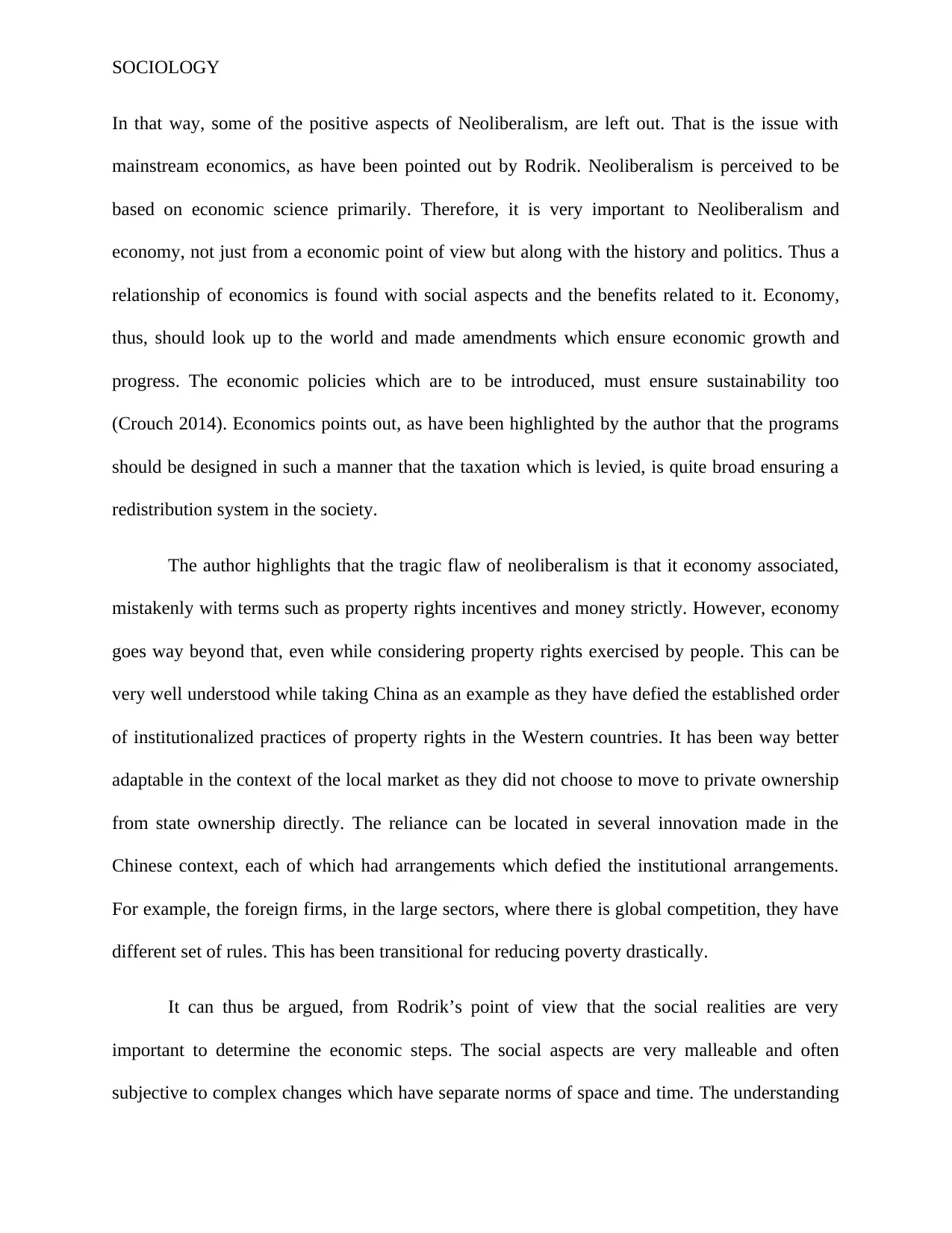
SOCIOLOGY
In that way, some of the positive aspects of Neoliberalism, are left out. That is the issue with
mainstream economics, as have been pointed out by Rodrik. Neoliberalism is perceived to be
based on economic science primarily. Therefore, it is very important to Neoliberalism and
economy, not just from a economic point of view but along with the history and politics. Thus a
relationship of economics is found with social aspects and the benefits related to it. Economy,
thus, should look up to the world and made amendments which ensure economic growth and
progress. The economic policies which are to be introduced, must ensure sustainability too
(Crouch 2014). Economics points out, as have been highlighted by the author that the programs
should be designed in such a manner that the taxation which is levied, is quite broad ensuring a
redistribution system in the society.
The author highlights that the tragic flaw of neoliberalism is that it economy associated,
mistakenly with terms such as property rights incentives and money strictly. However, economy
goes way beyond that, even while considering property rights exercised by people. This can be
very well understood while taking China as an example as they have defied the established order
of institutionalized practices of property rights in the Western countries. It has been way better
adaptable in the context of the local market as they did not choose to move to private ownership
from state ownership directly. The reliance can be located in several innovation made in the
Chinese context, each of which had arrangements which defied the institutional arrangements.
For example, the foreign firms, in the large sectors, where there is global competition, they have
different set of rules. This has been transitional for reducing poverty drastically.
It can thus be argued, from Rodrik’s point of view that the social realities are very
important to determine the economic steps. The social aspects are very malleable and often
subjective to complex changes which have separate norms of space and time. The understanding
In that way, some of the positive aspects of Neoliberalism, are left out. That is the issue with
mainstream economics, as have been pointed out by Rodrik. Neoliberalism is perceived to be
based on economic science primarily. Therefore, it is very important to Neoliberalism and
economy, not just from a economic point of view but along with the history and politics. Thus a
relationship of economics is found with social aspects and the benefits related to it. Economy,
thus, should look up to the world and made amendments which ensure economic growth and
progress. The economic policies which are to be introduced, must ensure sustainability too
(Crouch 2014). Economics points out, as have been highlighted by the author that the programs
should be designed in such a manner that the taxation which is levied, is quite broad ensuring a
redistribution system in the society.
The author highlights that the tragic flaw of neoliberalism is that it economy associated,
mistakenly with terms such as property rights incentives and money strictly. However, economy
goes way beyond that, even while considering property rights exercised by people. This can be
very well understood while taking China as an example as they have defied the established order
of institutionalized practices of property rights in the Western countries. It has been way better
adaptable in the context of the local market as they did not choose to move to private ownership
from state ownership directly. The reliance can be located in several innovation made in the
Chinese context, each of which had arrangements which defied the institutional arrangements.
For example, the foreign firms, in the large sectors, where there is global competition, they have
different set of rules. This has been transitional for reducing poverty drastically.
It can thus be argued, from Rodrik’s point of view that the social realities are very
important to determine the economic steps. The social aspects are very malleable and often
subjective to complex changes which have separate norms of space and time. The understanding
⊘ This is a preview!⊘
Do you want full access?
Subscribe today to unlock all pages.

Trusted by 1+ million students worldwide
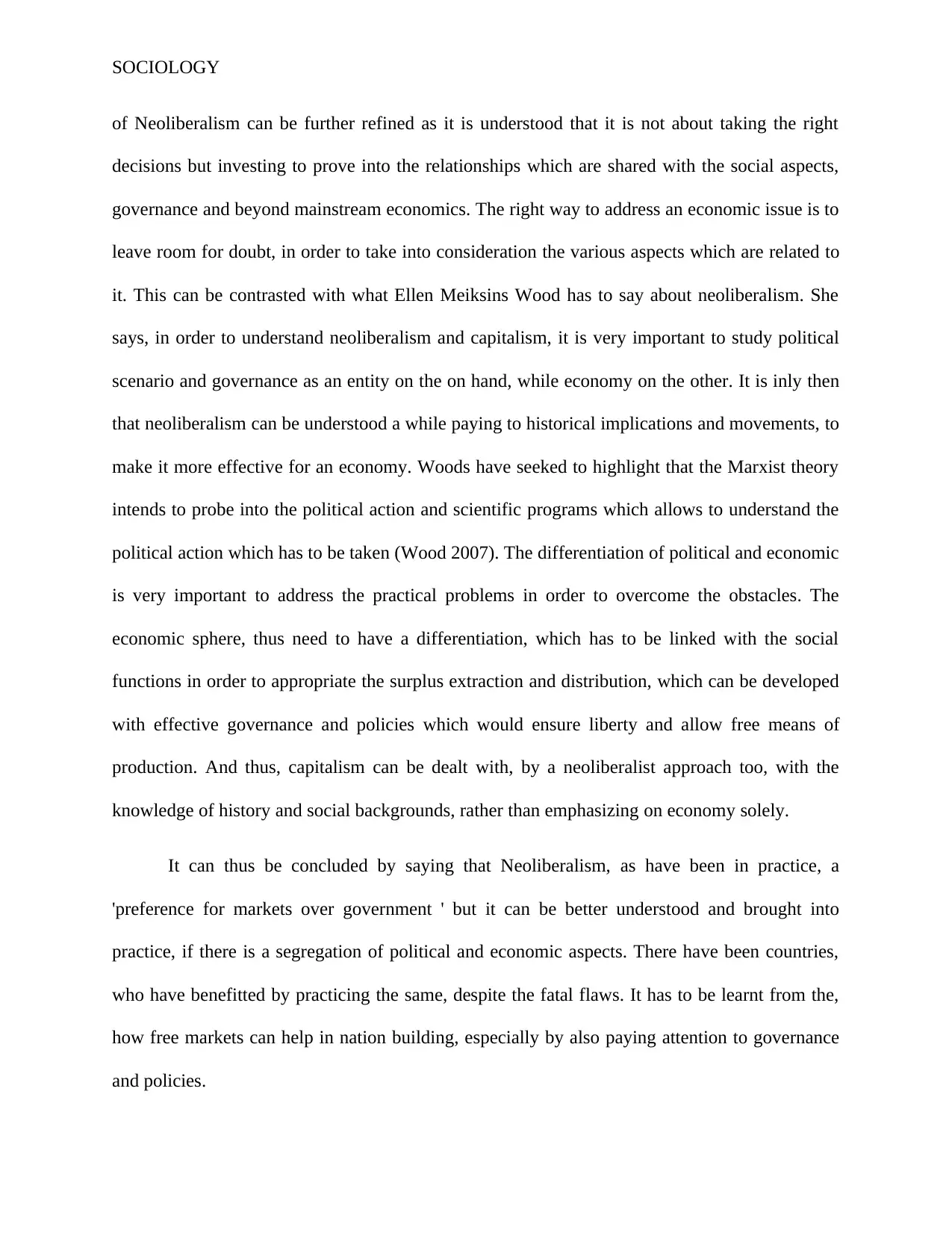
SOCIOLOGY
of Neoliberalism can be further refined as it is understood that it is not about taking the right
decisions but investing to prove into the relationships which are shared with the social aspects,
governance and beyond mainstream economics. The right way to address an economic issue is to
leave room for doubt, in order to take into consideration the various aspects which are related to
it. This can be contrasted with what Ellen Meiksins Wood has to say about neoliberalism. She
says, in order to understand neoliberalism and capitalism, it is very important to study political
scenario and governance as an entity on the on hand, while economy on the other. It is inly then
that neoliberalism can be understood a while paying to historical implications and movements, to
make it more effective for an economy. Woods have seeked to highlight that the Marxist theory
intends to probe into the political action and scientific programs which allows to understand the
political action which has to be taken (Wood 2007). The differentiation of political and economic
is very important to address the practical problems in order to overcome the obstacles. The
economic sphere, thus need to have a differentiation, which has to be linked with the social
functions in order to appropriate the surplus extraction and distribution, which can be developed
with effective governance and policies which would ensure liberty and allow free means of
production. And thus, capitalism can be dealt with, by a neoliberalist approach too, with the
knowledge of history and social backgrounds, rather than emphasizing on economy solely.
It can thus be concluded by saying that Neoliberalism, as have been in practice, a
'preference for markets over government ' but it can be better understood and brought into
practice, if there is a segregation of political and economic aspects. There have been countries,
who have benefitted by practicing the same, despite the fatal flaws. It has to be learnt from the,
how free markets can help in nation building, especially by also paying attention to governance
and policies.
of Neoliberalism can be further refined as it is understood that it is not about taking the right
decisions but investing to prove into the relationships which are shared with the social aspects,
governance and beyond mainstream economics. The right way to address an economic issue is to
leave room for doubt, in order to take into consideration the various aspects which are related to
it. This can be contrasted with what Ellen Meiksins Wood has to say about neoliberalism. She
says, in order to understand neoliberalism and capitalism, it is very important to study political
scenario and governance as an entity on the on hand, while economy on the other. It is inly then
that neoliberalism can be understood a while paying to historical implications and movements, to
make it more effective for an economy. Woods have seeked to highlight that the Marxist theory
intends to probe into the political action and scientific programs which allows to understand the
political action which has to be taken (Wood 2007). The differentiation of political and economic
is very important to address the practical problems in order to overcome the obstacles. The
economic sphere, thus need to have a differentiation, which has to be linked with the social
functions in order to appropriate the surplus extraction and distribution, which can be developed
with effective governance and policies which would ensure liberty and allow free means of
production. And thus, capitalism can be dealt with, by a neoliberalist approach too, with the
knowledge of history and social backgrounds, rather than emphasizing on economy solely.
It can thus be concluded by saying that Neoliberalism, as have been in practice, a
'preference for markets over government ' but it can be better understood and brought into
practice, if there is a segregation of political and economic aspects. There have been countries,
who have benefitted by practicing the same, despite the fatal flaws. It has to be learnt from the,
how free markets can help in nation building, especially by also paying attention to governance
and policies.
Paraphrase This Document
Need a fresh take? Get an instant paraphrase of this document with our AI Paraphraser
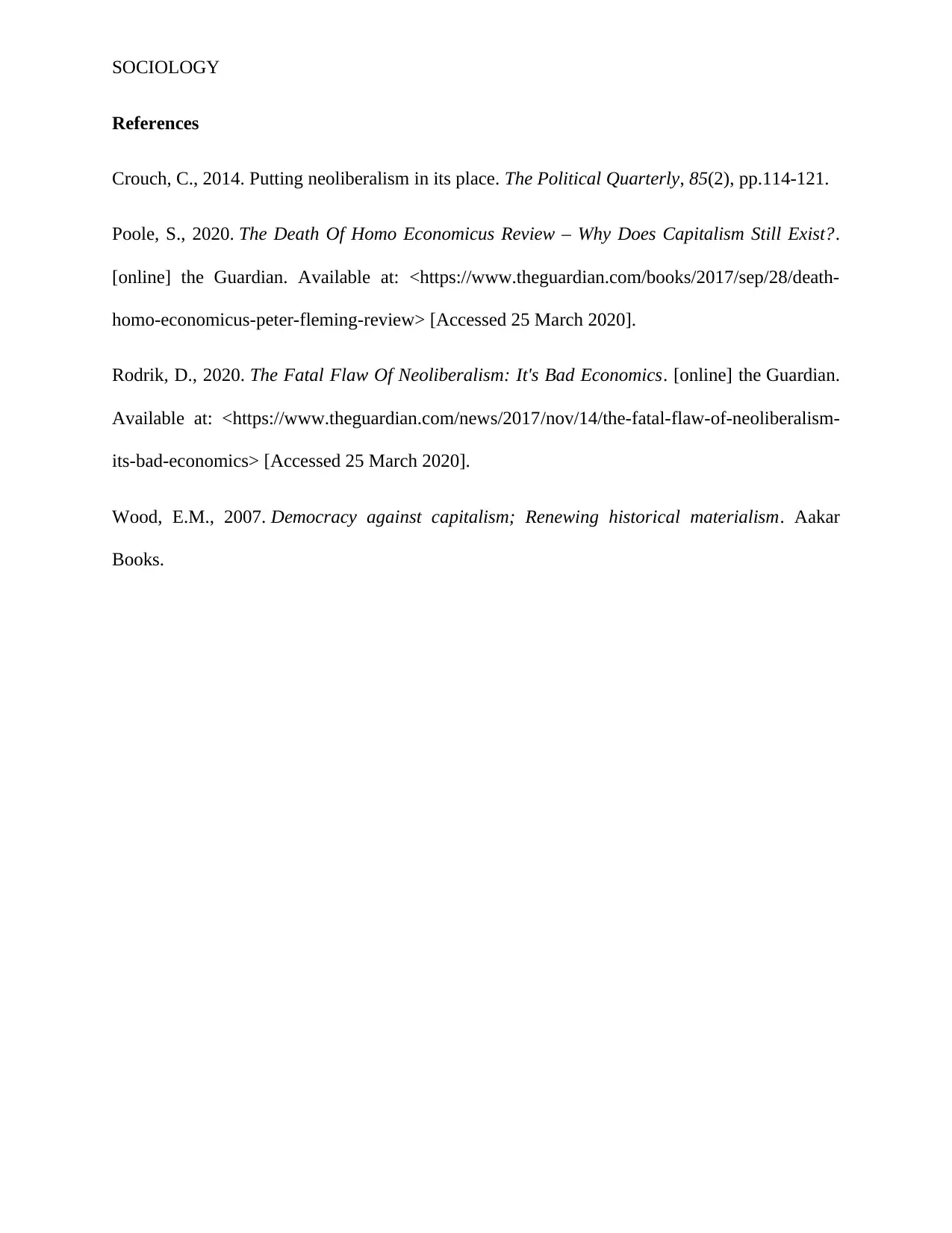
SOCIOLOGY
References
Crouch, C., 2014. Putting neoliberalism in its place. The Political Quarterly, 85(2), pp.114-121.
Poole, S., 2020. The Death Of Homo Economicus Review – Why Does Capitalism Still Exist?.
[online] the Guardian. Available at: <https://www.theguardian.com/books/2017/sep/28/death-
homo-economicus-peter-fleming-review> [Accessed 25 March 2020].
Rodrik, D., 2020. The Fatal Flaw Of Neoliberalism: It's Bad Economics. [online] the Guardian.
Available at: <https://www.theguardian.com/news/2017/nov/14/the-fatal-flaw-of-neoliberalism-
its-bad-economics> [Accessed 25 March 2020].
Wood, E.M., 2007. Democracy against capitalism; Renewing historical materialism. Aakar
Books.
References
Crouch, C., 2014. Putting neoliberalism in its place. The Political Quarterly, 85(2), pp.114-121.
Poole, S., 2020. The Death Of Homo Economicus Review – Why Does Capitalism Still Exist?.
[online] the Guardian. Available at: <https://www.theguardian.com/books/2017/sep/28/death-
homo-economicus-peter-fleming-review> [Accessed 25 March 2020].
Rodrik, D., 2020. The Fatal Flaw Of Neoliberalism: It's Bad Economics. [online] the Guardian.
Available at: <https://www.theguardian.com/news/2017/nov/14/the-fatal-flaw-of-neoliberalism-
its-bad-economics> [Accessed 25 March 2020].
Wood, E.M., 2007. Democracy against capitalism; Renewing historical materialism. Aakar
Books.
1 out of 5
Related Documents
Your All-in-One AI-Powered Toolkit for Academic Success.
+13062052269
info@desklib.com
Available 24*7 on WhatsApp / Email
![[object Object]](/_next/static/media/star-bottom.7253800d.svg)
Unlock your academic potential
Copyright © 2020–2026 A2Z Services. All Rights Reserved. Developed and managed by ZUCOL.





